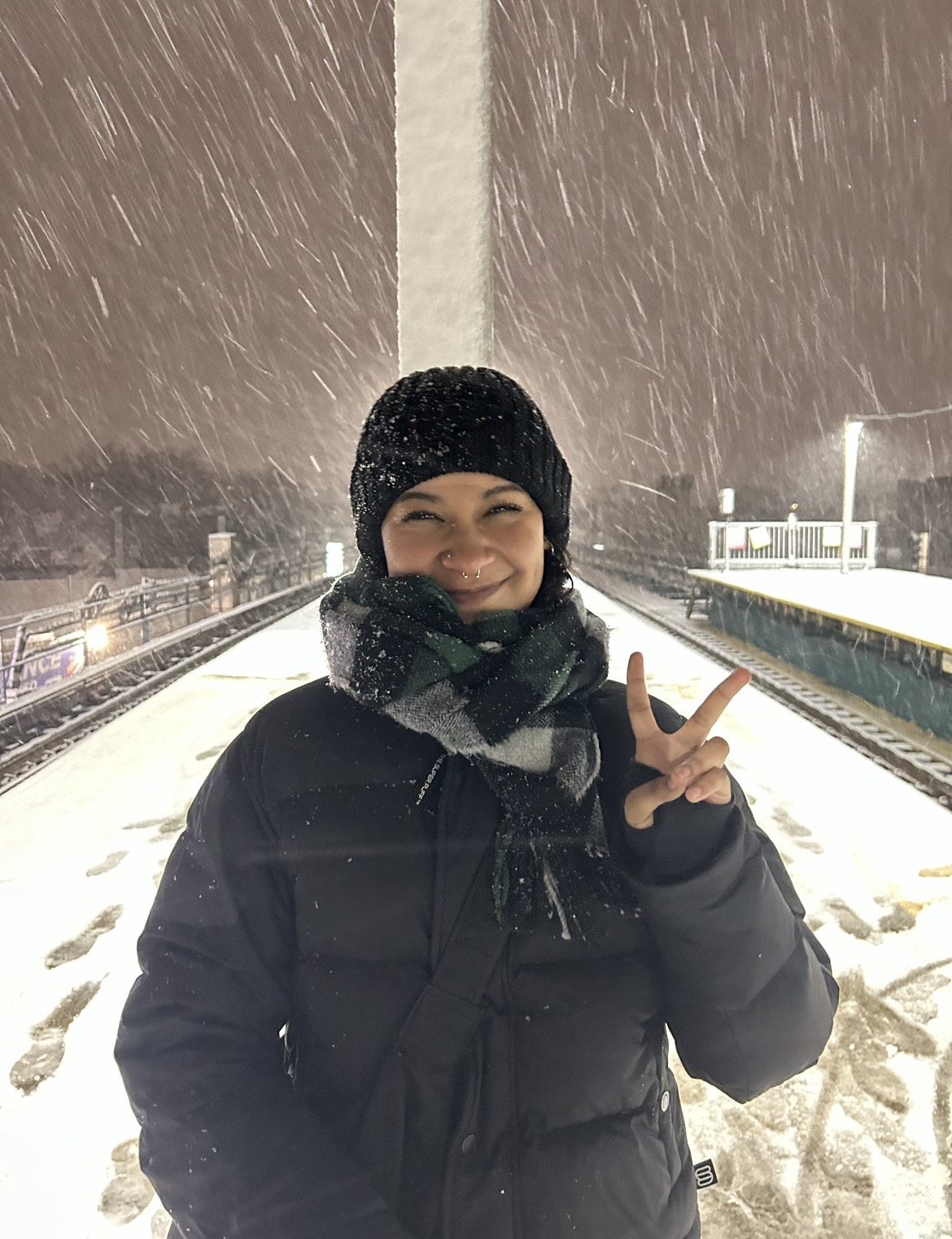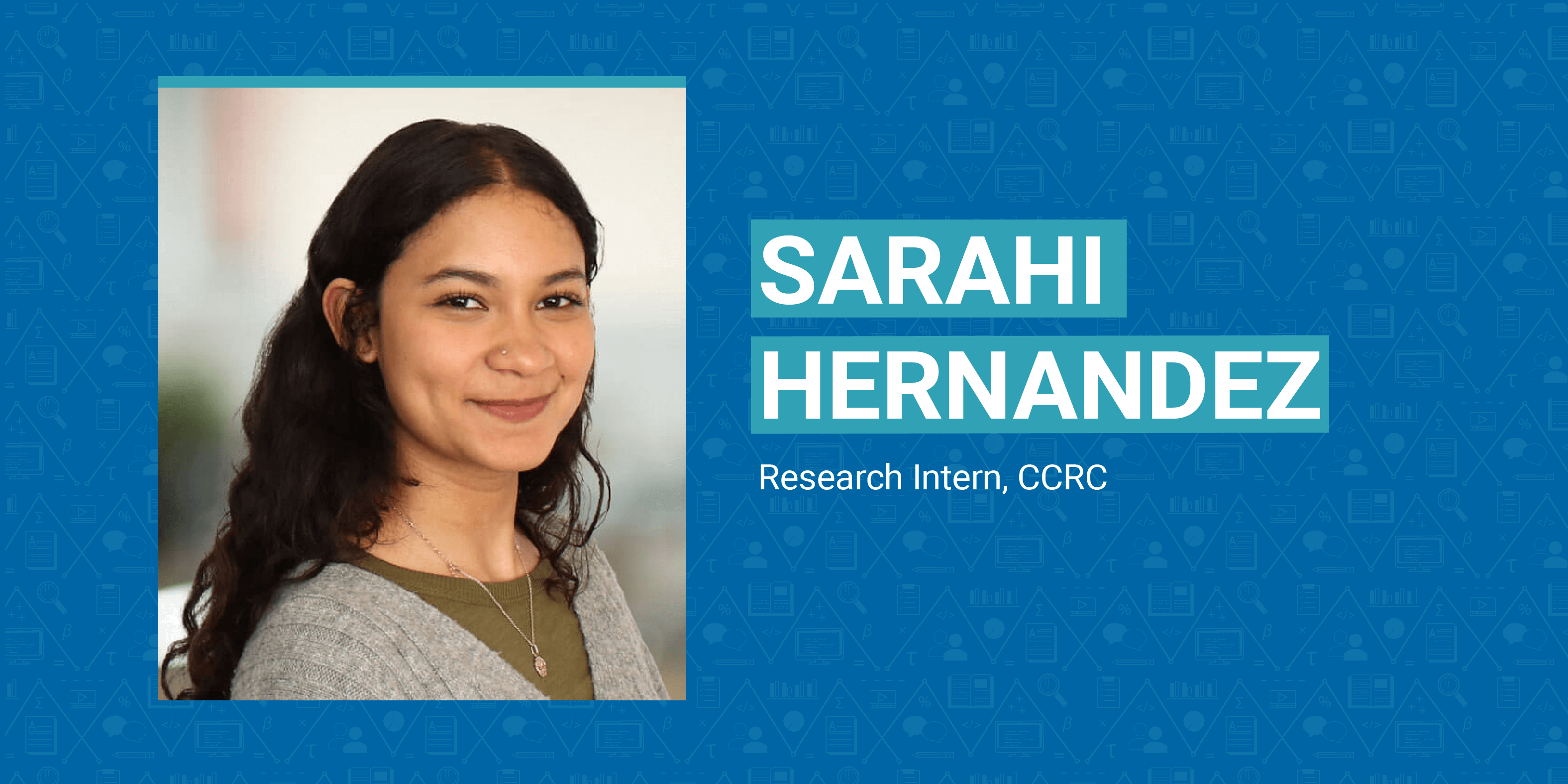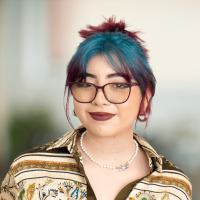Sarahi Hernandez is a rising senior at the City College of New York studying sociology and anthropology with a minor in women’s and gender studies. Hernandez identifies as a queer Latina with ancestry from both the Dominican Republic and Guatemala; her pronouns are she/they. She is interning at CCRC this summer as a research assistant through the S Jay Levy Fellowship at City College. Hernandez is currently working on research investigating multiple measures assessment as an alternative to standardized testing for placement in developmental courses. In this Q&A, Hernandez explains her interest in higher education research and how she came to CCRC.
This Q&A was edited and condensed.
Emily Perez: What are you currently studying and why?
Sarahi Hernandez: After realizing I didn’t want to be an environmental science major freshman year, I took this one sociology class called Transnational Feminism, which is basically learning about key figures and movements in feminist history on a transnational scale, and immediately knew that sociology was what I wanted to study. I added anthropology later on as a double major since I feel they’re interconnected in that they both study human cultures, behaviors, and societies. I also added women’s and gender studies as my minor because I like learning about women’s roles in immigration and society. I feel like what I’m studying helps me understand who I am and where I come from. I grew up in a Dominican and Guatemalan household, but I felt a weak connection to my heritage. Studying sociology and anthropology lets me reconnect with my roots, while my minor allows for self-exploration and identity building.
Perez: What is your personal connection to higher education? Did you face any obstacles in accessing higher education?
Hernandez: My mom has always instilled in me the idea of pursuing higher education. My parents grew up in circumstances that limited their access to education. My mom got her associate degree at LaGuardia Community College, and my dad wasn’t able to graduate high school. They’re a huge motivation when it comes to finishing my bachelor’s degree and getting a doctorate. I’m doing this for myself, too, though. I’ve always wanted to be good at something and to be satisfied with what I’ve learned, and college feels like the place to be able to do that. I want to be able to feel like I know about my field of study to the point where I could teach it. This would give me a sense of purpose, since I knew from a young age I wanted to make a change through education.
I feel like the only obstacle I really faced in accessing higher education has been my confidence. Sometimes I feel like I have a pessimistic view of myself, even though I try to be an optimistic person. When applying to undergraduate schools, I really wanted to apply to a few Ivy League colleges on the East Coast, for example, but I tend to question myself. I would be like, “Let’s be real, Sarahi,” which stunts my growth and narrows down my opportunities. This obstacle is one that I am overcoming daily as I speak more with people who have doctoral degrees about the journeys they went through. I’m beginning to accept that my journey can take different turns and that it’ll be okay in the end.
Perez: Why did you join the CCRC team, and what is your role here?
Hernandez: I found CCRC through the S Jay Levy fellowship offered at my college. It’s a fellowship that gives students the opportunity to intern for companies like Chase, the Queens Public Library, and more. I saw CCRC listed under this fellowship and thought it would be a great opportunity to see what it’s like to be in a space like Columbia University. I saw this internship as a way to push myself and to see what I’m capable of. I went through a few interviews, and now I’m a research assistant intern here.
Perez: What are you currently working on at CCRC, and how do you feel about it?
Hernandez: I’m currently working on a project researching multiple measures assessment (MMA), which provides alternative placement practices for incoming college students instead of standardized testing like the SAT, ACT, and Accuplacer. Standardized testing is traditionally used by most colleges, and it’s usually a big key factor in determining college placement and readiness. MMA, on the other hand, uses alternative ways to assess a student’s college readiness through high school GPA, high school performance data, and other state-provided exams. My team is focusing on Texas and Arkansas—two different states when it comes to standardized testing policies—to research MMA. The goal is to introduce and understand the effects of a new developmental education reform that challenges the traditional reliance on standardized testing.
I started working on this project not knowing what to expect since I had never done research before. Yet, now that I’ve picked up some experience at CCRC, I can say that I really love the experience and my team. My supervisors have helped me a lot to put together the storyline for the research. They were really helpful when it came to guiding me through the process of drafting a storyline and researching policy, and they answered any questions I had. Assisting in research that will reform education practices for the greater good has been a great challenge, and I continue to learn how to engage in research work. I really appreciate the guidance at CCRC, and I’m really interested in qualitative research now that I’ve participated in this project. In the future, I would love to do more qualitative research and participate in interviewing people, coding transcripts, and more.
Perez: What are your career goals and aspirations for the future?

Sarahi Hernandez
Hernandez: I’ve always wanted to achieve a doctoral degree. Once I finish my bachelor’s, I want to go straight into my master’s and then get a doctoral degree. But honestly, since talking to coworkers at CCRC, I’ve been considering taking a gap year and just trying out different interests like interning at a museum, combining art history and sociology, and getting more research experience.
A big goal for me is to be able to look back at my accomplishments and be proud of myself. Maybe I’d like to publish a book or be a museum curator. I’m not too sure about what exactly I want to do; I just know I want my work to help people.





